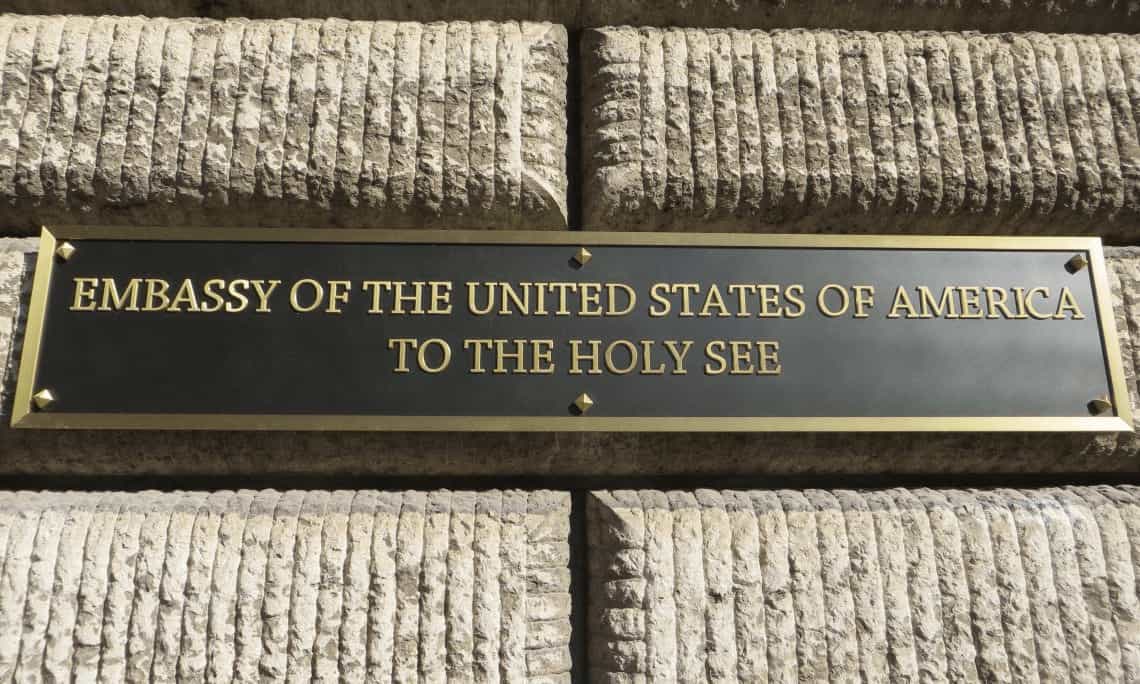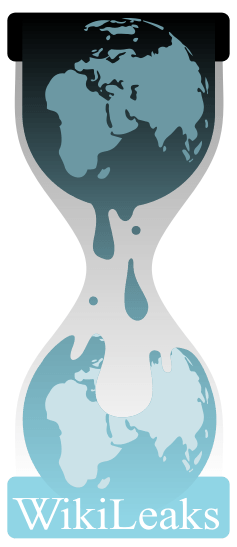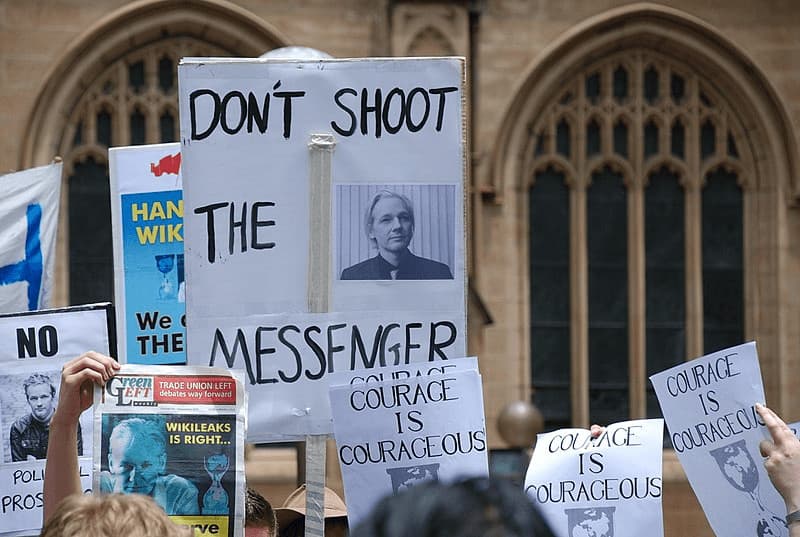As the hearings of Wikileaks founder Julian Assange continue, the question of whether he will be extradited to the United States remains uncertain. New scandals continue to pop up as Assange contends that former Congressman Dana Rohrabacher said that President Trump would give him a pardon in exchange for disclosing the source of the Hillary Clinton emails.
Nevertheless, the impact of Assange and Wikileaks starts far before the 2016 election and his current trials that brought him further notoriety.
Wikileaks first reached international prominence at the beginning of 2010 with the release of U.S. military and diplomatic documents. The quarter of a million diplomatic cables Wikileaks published became known as Cablegate and were published by news organizations around the world. These cables are often credited as serving as a catalyst for the Arab Spring by revealing the corruption in numerous governments around the world, especially the Middle East.
Wikileaks operations continue to remain controversial as some claim that the public has a right to know the information, while others contend that Assange is nothing more than a common criminal. However, no matter one’s stance on the Wikileaks revelations, their influence on U.S. diplomacy cannot be understated. U.S. diplomats were applauded for their hard-hitting and accurate reports, but their revelation and exposure greatly hurt the trust of their contacts abroad and put some of them in danger.
Ambassador Kenneth Hackett, Ambassador Paul Trivelli, Ambassador Gordon Gray, Carol Kalin, and Beth Payne discuss the impact Wikileaks had on U.S. diplomacy and how they adapted to the release of their information.
Drafted by Ty Ashton Ehuan
ADST relies on the generous support of our members and readers like you. Please support our efforts to continue capturing, preserving, and sharing the experiences of America’s diplomats.
Excerpts:
Ambassador Gordon Gray
Tunis, Tunisia—Ambassador (2009–2012)
Gordon Gray was interviewed by Charles Stuart Kennedy on February 10, 2016.
Read Gordon Gray’s full oral history HERE.
“There was a serious effect on how we do business, and it affected the lives of our contacts and the lives of some of our colleagues.”
Q: I want to go back just a bit for somebody who is reading this is from a different generation. Could you just briefly just explain what WikiLeaks were?
GRAY: Sure – let me really back up. One of the findings of the 9/11 Commission was that there was too little information being shared among U.S. Government agencies. The phrase that entered the lexicon was that there had been a failure to connect the dots. As the laws of physics show us, for every action there is an equal reaction. As a result, for [that] reason almost all State Department cables were made available to U.S. military websites and in the case of WikiLeaks. A Private First Class (PFC) at a Foreign Operating Base was able to download perhaps hundreds of thousands of State Department cables. Some of the cables were routine unclassified messages, but others reported on sensitive political issues and/or named sources. The PFC gave the cables to an organization called WikiLeaks, which is headed by Julian Assange, and they were published.
Q: Yeah and obviously they caused quite a sensation in foreign ministries and our Department of Defense.
GRAY: They absolutely did, as very candid observations were shared. My good friend Gene Cretz was our ambassador in Libya at the time. We had served together in Pakistan on our first tour and we had served together in Cairo. He was threatened by the Libyans following the publication of some of Embassy Tripoli’s cables, and the U.S. Government decided to withdraw him from Tripoli for his own safety. If people think WikiLeaks was only a matter of some cables being released, they are not looking at the complete picture. There was a serious effect on how we do business, and it affected the lives of our contacts and the lives of some of our colleagues.
….
That would have been November of 2010, so most of the cables that were leaked – I should say stolen – had been written by the previous team. I remember reading many of them when I was Deputy Assistant Secretary. Among other things, they chronicled meetings with human rights activists and also the level of corruption that I had alluded to. In particular, they discussed Ben Ali’s family taking control of assets and businesses, and always pressing to increase its role. So they created a bit of sensation, as you can imagine, in Tunisia and elsewhere, of course. Some embassy contacts were burned, unfortunately, and we had prominent people saying, “Listen, I’m not going to talk to you for a while because of what I saw.” After the revolution, they made themselves available again, but their reluctance after being burned was totally understandable.
The Department gave us a heads up that the cables were going to be released, but we didn’t know which cables would be or exactly when they would come out. I wanted to get the advice of my Deputy Chief of Mission, Natalie Brown, and my political/economic counselor, Ian McCary, on how to proceed with the Tunisian government. Natalie and I had served together in IO, and Ian and I had served together in both Cairo and Baghdad. I had kept in touch with both of them when we weren’t serving together. I trusted their judgment implicitly. I wasn’t sure whether I should give the foreign minister a heads up or not. I didn’t see how that conversation was going to have a happy conclusion. That wasn’t necessarily a problem, because you get paid the big bucks to have unhappy conversations, but I wasn’t sure how it would protect U.S. interests. Natalie and Ian rightly advised me to speak with him. I spoke with him one-to-one and told him “I have no idea what is going to be in these cables, but they are confidential cables and are therefore very likely to be embarrassing.” The cables came out, and since some of them discussed the Ben Ali family’s corruption, the natural question was how would the Palace respond. The Tunisian government was in a bit of a quandary. Some people in Washington thought I was going to get kicked out not – not because of anything I had written or done, but simply because I was the U.S. ambassador at the time. The Tunisian government basically decided to take the high road, which was probably the right tactical decision. Asking me to leave would have brought even more attention to the issue of corruption. I was convoked, tellingly not by the foreign minister but by Ben Dhia, who was an advisor at the Palace and who was very close to the president. He confirmed that they were not going to make it an issue and I am not sure that they had much choice. If they pursued some sort of retribution, it would only serve to validate the criticism.
That being said our Assistant Secretary for Economic and Business Affairs came for a visit a couple weeks later. We met with the Foreign Minister, who just chewed him out over this issue. After the revolution, the Foreign Minister apologized to me for the times he chewed me out, saying “I got instructions from the Palace to do so.” He added, and I’ll always remember the phrase, “with fire in my eyes.” I was glad to hear it, not because I wanted an apology, but because Ian and I never felt his heart was in it. I did the WikiLeaks meeting one-on-one, but otherwise I always took Ian as my note taker because he wrote very well, he had very good judgment, and I trusted him totally.
………………………………………………………………………………..
Ambassador Kenneth Hackett
Vatican City, the Holy See—Ambassador (2013–2017)
Kenneth Hackett was interviewed by Charles Stuart Kennedy on March 8, 2018.
Read Kenneth Hackett’s full oral history HERE.
“We downplayed unnecessary characterizations of individuals because we weren’t sure where our cables were headed.”

One of the things I found when I got there very early, one of the assistant secretaries had served there as a political officer four or five years previously, and she mentioned to me that there was something called WikiLeaks, which you are well familiar with. And some of her cables about the Vatican were leaked. She didn’t describe it in a deleterious way, but when I got to Rome, my DCM said, “We have some problems. There are many people inside, in the Vatican who won’t talk to us because there were cables about them which came out in WikiLeaks and they were not favorable. And indeed, that’s what I found initially, that there were certain people who would attend the meeting with you, but wouldn’t say a thing, and that’s a hard position to sustain, so I really had to work on that full-bore right off the bat.
Q: Yeah, well the WikiLeaks business was affecting our diplomacy all over the world. This is one of the things that it’s not that people are discussing great state secrets, but they’re talking frankly, and that talk is fine if it’s not made public. And this so-called freedom of information that everybody can know everything that was being said worked to the disadvantage of so many of us in the diplomatic field.
HACKETT: That’s right because you’re trying to be candid in your assessment of individuals of some import to you and then when you find that candor show up publicly, boy, that really messes up the whole business. That was one of the initial issues that I had to deal with as other ambassadors did as well.
Q: How did you manage this? In the first place, develop a style of writing, of reporting, that would sort of cover your bases and still get the information out?
HACKETT: We downplayed unnecessary characterizations of individuals because we weren’t sure where our cables were headed. If we didn’t need to add a name to a discussion, but rather just talked about a Vatican interlocutor without naming the person, we wouldn’t. Now, if we had to put a name to it, we did, and that would usually go on the high side. But we were intentionally cautious, at least until I was better known in the Vatican and trusted a little bit more.
………………………………………………………………………………..
Ambassador Paul Trivelli
Miami, Florida—Civilian Deputy to the Commander at USSOUTHCOM (2008–2010)
Paul Trivelli was interviewed by Dr. Bradley Coleman on August 29, 2011.
Read Paul Trivelli’s interview with USSOUTHCOM HERE.
Read Paul Trivelli’s full oral history HERE.
“…it contributed to the departure of the U.S. ambassadors in Mexico and Ecuador.”
Q: What impact has the Wikileaks revelations had on American diplomacy in Latin America and the Caribbean?
TRIVELLI: Well, directly, of course, it contributed to the departure of the U.S. ambassadors in Mexico and Ecuador [Heather Hodges; and Carlos Pascual, U.S. ambassador to Mexico, August 2009 to March 2011]. Part of that had to do with the host governments’ disquiet with the supposed revelations in those cables. I think certainly people, foreign government officials, and others are probably less candid with us now that those came out because they assumed that any conversation they had with us will be protected. Unfortunately, these alleged cables have been leaked.
Q: How frustrating is that to you as a diplomat?
TRIVELLI: I think it’s very frustrating, because just like a newspaper reporter, if you start revealing your sources, you’re not going to be able to write too many more stories. It’s really the same with us. One thing that’s surprising in a diplomatic career is how much people want to talk to us or are willing to talk to us—how open members of the local community are with U.S. diplomats. And if they feel that their confidences will be betrayed, obviously, they’re less willing to talk to people. It’s a matter of trust.
………………………………………………………………………………..
Beth Payne
Kolkata, India—Consul General (2008–2011)
Beth Payne was interviewed by Charles Stuart Kennedy on April 10, 2019.
Read Beth Payne’s full oral history HERE.
“There were thousands and thousands of classified cables released.”
PAYNE: This was when Chelsea Manning released the cables. There were thousands and thousands of classified cables released. And what was interesting is that WikiLeaks would give collections of cables to various news outlets. They didn’t put all of them on their website. One of our jobs was to review all the classified cables that we had sent to get an idea of what was going to go public. There was one newspaper that every day was releasing cables. I had met with Mamata Banerjee discreetly at a social event and had a long conversation with her. She told me things that if released to the public probably would have hurt her chances to win. I was sure that we had written a cable on it. We looked and looked for that cable. We could not find that cable, only to realize that the political officer who I had given my notes to and said, “Please could you write this up,” forgot. And I had forgotten. But thank goodness we never sent that cable because it would have disrupted the elections. It would have hurt her if there had been a cable from me saying what I said. I was so relieved. I thought, “Oh my goodness, that’s the best luck ever, that that cable was never written.” On the other hand, I had good contacts, who I had to meet with and say, “I wrote a cable with your name in it. Here’s what it said. I don’t know if it’s going to get leaked, but I want to give you a heads up. What can I do?” And it was horrible. It was awful because we have contacts with whom we become friends. We might write a cable about what our friend told us last night over a beer. So, they’re a friend, but they’re not. I mean, you’re writing a cable. So, you have this very gray area where no one’s your genuine friend.
Q: Well look, when we were officials, we were reporting on these people in what we hope are objective things. And nobody’s perfect.
PAYNE: Right. But now it’s public. In one case, I wrote a cable about what a news editor told me about his boss, who was influential in Bengali politics. I told him and I said, “How can I make this right for you?” He said, “Please meet with my boss and tell my boss.” I went to this very powerful figure and I sat down and said, “Look, I have something I need to tell you. There is a cable that says that you said X, Y, and Z, and it might get leaked.” At first, he was upset. Then, he said, “Wow, you care what I say.” He then got flattered. After he went through his stage of “Holy shit, what I said could be public.” This guy has a role in India that’s pretty powerful. He doesn’t want the things that he says privately in the newspaper. But then, he thought, “Wow, you care? You care what I say?” Then he was fine. But it was pretty traumatic, the WikiLeaks exposure.
………………………………………………………………………………..
Carol Kalin
Nouakchott, Mauritania—Deputy Chief of Mission (2010–2012)
Carol Kalin was interviewed by Charles Stuart Kennedy on November 10, 2014.
Read Carol Kalin’s full oral history HERE.
“The Department or Washington panic, almost, over WikiLeaks was quite remarkable.”
Q: Were there any incidents or disasters, coups?
KALIN: Well, I think, as I said the country had experienced the coup and more or less righted itself by the time I arrived. But there was one echo of that that’s probably worth telling about. WikiLeaks happened shortly after I arrived in Mauritania and because of the intensity of the coup and post-coup and election period the embassy in Nouakchott had done a voluminous amount of great reporting. Much of that reporting was disclosed in WikiLeaks. Now, most of the officers who had signed those reports were gone by the time WikiLeaks happened, but there was one young officer who was still in place. And it was a serious question for her how to handle this problem. She did well. She had to face some embarrassment among her contacts but ultimately she was able to overcome that and remain very effective in the section. There was a lot of confirmation, sort of grudging admiration from our European colleagues that appeared in the press that came to us as well in Mauritania, along the lines of, we assumed that Americans are naïve and unaware of the internal dynamics of a society like Mauritania, but we were wrong. We now see in your confidential cables that you indeed do know what’s going on. So that was quite an interesting phenomenon.
The Department or Washington panic, almost, over WikiLeaks was quite remarkable. We didn’t have, fortunately, too much concern over individuals among our contacts, fortunately. Some were embarrassed but thankfully nothing more.
Q: Well, did you have the feeling that there was a clampdown on confidential conversations and all?
KALIN: Certainly there was more caution in reporting after WikiLeaks and I think that’s unfortunate. We basically, at least at our post, we did what we needed to do, just with another level of awareness and reminder that we needed to be clear when something was reportable. We needed to a certain extent watch the tone of our reporting but I think we managed to stay on track, more or less, because otherwise what is our value? There’s a certain level of achievement represented by that grudging admiration from the Europeans, a certain amount of realism and even gritty detail that we need to maintain. Otherwise, truly we can all be replaced by, I don’t know, social media and phone calls. I never believed in that and I still don’t


